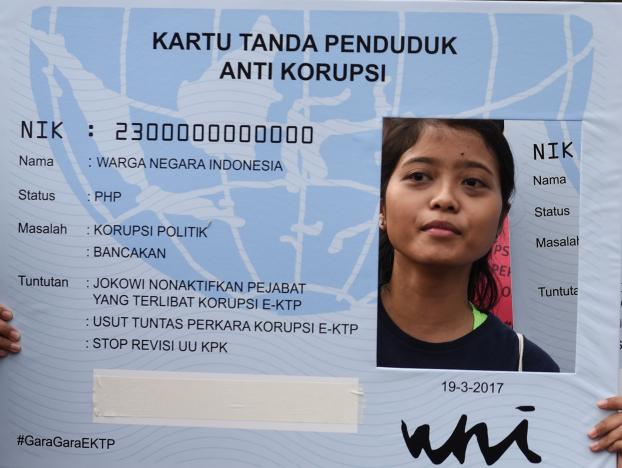A corruption investigation into dozens of politicians is a cause for concern in Southeast Asia’s biggest economy, but no other country has taken such a tough stance against graft over the past decade, Indonesian Vice President Jusuf Kalla said.
The anti-graft agency, known by its Indonesian initials KPK, has put on trial two suspects and is looking into claims that at least 37 people benefited from the theft of $170 million linked to a national electronic identity card.
The accusations in a KPK indictment letter say sums ranging from $5,000 to $5.5 million were openly divided up in a room in parliament. Those implicated include members of President Joko Widodo’s ruling party, a minister, the speaker of parliament and opposition party members.
The scale of the alleged theft has created sensational headlines, even in a country long used to epic corruption scandals. The fact that it involves parliament will be less of a surprise. In a survey by global watchdog Transparency International, Indonesians perceived the parliament as the country’s most corrupt institution.
“If you see…so many corruption cases and (think) that means there is so much corruption, fine. But on the other hand, you can see too how Indonesia is being very tough in combating corruption,” Kalla said in an interview when asked about the e-KPT (electronic Resident Identity Card) case.
Despite repeated efforts by politicians and police to undermine it, the KPK has remained one of Southeast Asia’s most effective and independent agencies. It investigated 91 people last year, a record in its 15-year history, data provided by the agency showed.
“No other country has within 10 years jailed nine ministers and 19 (provincial) governors, and other high-ranking officials and members of parliament,” Kalla told Reuters.
The World Economic Forum’s 2015-16 Global Competitiveness Report said its data suggested efforts to tackle corruption were paying off, with Indonesia “improving on almost all measures related to bribery and ethics”.
Even so, Indonesia ranked 90 out of 176 countries in Transparency’s annual Corruption Perceptions index last year, on par with countries such as Liberia and Colombia.
PERFECT CONVICTION RECORD
The KPK, which claims a 100 percent conviction record, has 1,200 staff and can wiretap without a warrant. Once it begins an investigation, there is no legal mechanism to halt it.
But taking on vested interests can come with a cost. Four years ago, the KPK had to call in public support to barricade its headquarters after a squadron of police demanded the handover of an investigator who was probing graft among top police officers.
Then there was the jailing of former KPK chief, Antasari Azhar, who claims he was framed for murder to derail an investigation into voting fraud during the 2009 presidential election. He was granted clemency this year.
Indonesian media have splashed the graft scandal on front pages, though President Widodo has urged the public to presume innocence until proven guilty.
The probe also comes as religious and political tensions are running high, with a bitterly fought Jakarta election emerging as a proxy fight ahead of 2019 presidential vote.
However, the fact that those identified in the KPK indictment come from most of the main parties and that any probe is likely to be lengthy should limit political fallout.”From the start, we understood that this will not be a short process. We say it is like running a marathon,” KPK Chairman Agus Rahardjo told a briefing, where he said the agency would eventually go after the big fish implicated.
TENSIONS WITH PARLIAMENT
The case dates from 2009 and centers on the alleged mark-up of the procurement budget for the government’s program for electronic ID cards.
The suspects on trial, two home ministry officials, named parliament speaker Setya Novanto and members of the ruling Indonesian Democratic Party of Struggle (PDIP), including Justice Minister Yasonna Laoly, according to the indictment.
Laoly and Novanto have not been indicted and deny any wrongdoing.
A PDIP official said the party was questioning members and would respect any legal process.
Tensions between the KPK and parliament have festered for years and some members suggested political motives behind the probe.
Lawmakers have previously proposed reining in the KPK’s surveillance powers and allowing a parliamentary body to end graft investigations when it chooses.An expert parliamentary body is seeking public input on revisions that would require the KPK to get permission from a supervisory council for wiretapping and allow the agency to drop a case in limited circumstances.
(Additional reporting by Fergus Jensen; Writing by Ed Davies; Editing by Bill Tarrant)




